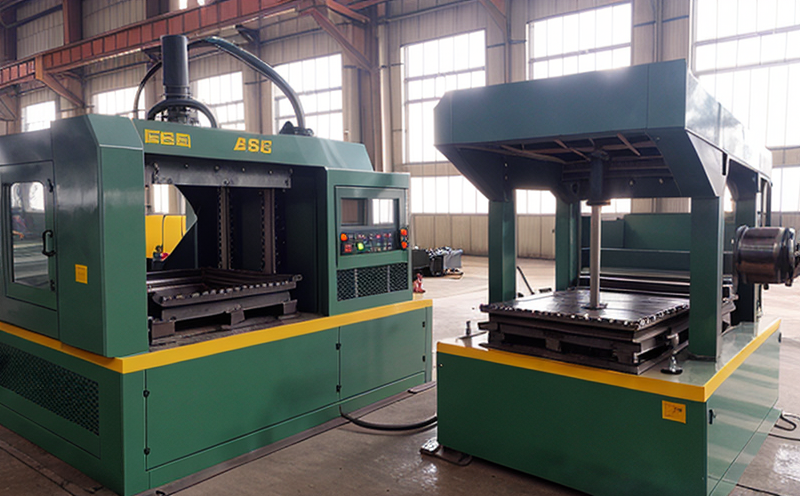ASTM E8 Tensile Testing of Forged Metals
The ASTM E8 standard provides a comprehensive framework for tensile testing of forged metals, which is critical for ensuring material integrity and quality in industrial manufacturing processes. This test evaluates the mechanical properties of metallic materials by measuring their tensile strength, yield strength, and elongation under controlled conditions.
Tensile testing involves subjecting a specimen to gradually increasing tensile load until it fractures. The resulting data allows manufacturers to assess how well the material will perform in real-world applications. Forging is a common metalworking process that shapes metal by applying compressive forces, and ASTM E8 ensures that the resultant forgings meet stringent quality standards.
The testing procedure outlined in ASTM E8 involves several key steps:
- Selection of appropriate specimens
- Properly preparing the specimens for testing
- Calibrating and operating the tensile testing machine correctly
- Performing the test under controlled conditions to ensure accuracy
- Analyzing the results to determine material properties
The ASTM E8 standard specifies that specimens should be machined from the forged part or a representative sample. Specimen preparation is crucial as it directly affects the reliability of test results.
For accurate tensile testing, several factors must be considered:
- Specimen geometry
- Load cell accuracy and calibration
- Environmental conditions during testing
- Data recording and analysis methods
The ASTM E8 standard also provides guidance on specimen preparation, which typically involves machining the specimen to a specific geometry. This ensures that the test results are representative of the material's properties.
During testing, the tensile testing machine applies force to the specimen until it fractures. The load and elongation data collected during this process is used to calculate key mechanical properties:
- Tensile strength
- Yield strength
- Elongation
The ASTM E8 standard specifies the minimum tensile strength required for forged metals in various applications. Compliance with these standards is crucial for ensuring product quality and safety.
In addition to mechanical properties, ASTM E8 also provides guidance on heat treatment procedures that can affect material properties. Proper heat treatment is essential for optimizing material performance. Forged metals may undergo different heat treatments such as annealing or quenching before undergoing tensile testing.
The results of ASTM E8 tensile testing are crucial for quality control and product development in industrial manufacturing processes. They help ensure that forged parts meet the required specifications and can be relied upon in real-world applications. Compliance with these standards is essential for maintaining a high level of product quality and safety.
Eurolab Advantages
EuroLab offers unparalleled expertise and advanced facilities to conduct ASTM E8 tensile testing on forged metals. Our team of experienced engineers and technicians ensures that every test is conducted with precision and accuracy, adhering strictly to the ASTM E8 standard.
- Comprehensive Testing Capabilities: EuroLab can perform a wide range of tests required for quality assurance in industrial manufacturing processes.
- State-of-the-Art Equipment: Our laboratory is equipped with high-precision tensile testing machines capable of providing accurate and reliable results.
- Detailed Reporting: EuroLab provides detailed reports that include all test parameters, specimen preparation, and analysis methods used during the testing process.
EuroLab's commitment to quality ensures that our clients can trust in the accuracy of their test results. By partnering with us, you can be confident that your forged metals meet the highest standards of quality and safety.
Environmental and Sustainability Contributions
- Reducing Waste: Proper specimen preparation reduces waste by ensuring that only necessary material is used for testing, minimizing environmental impact.
- Sustainable Materials: Ensuring the quality of materials through ASTM E8 testing helps manufacturers select sustainable materials that meet strict performance criteria.
- Energy Efficiency: By adhering to precise testing protocols, EuroLab minimizes energy consumption during testing processes, contributing to overall sustainability goals.
EuroLab's commitment to environmental and sustainability practices extends beyond the laboratory. We work closely with our clients to identify areas where we can further reduce our carbon footprint and promote sustainable manufacturing practices.
Use Cases and Application Examples
The ASTM E8 tensile testing of forged metals is widely used in various industries, including automotive, aerospace, and construction. Here are some specific applications:
- Automotive Industry: Ensuring the structural integrity of components like engine blocks or transmission housings.
- Aerospace Industry: Verifying the strength and reliability of parts used in aircraft engines or frames.
- Construction Industry: Evaluating the durability and performance of structural steel elements such as beams or columns.
These tests are critical for ensuring that forged metals meet the stringent requirements set by international standards. By adhering to ASTM E8, manufacturers can ensure that their products are safe, reliable, and perform as expected in real-world applications.





